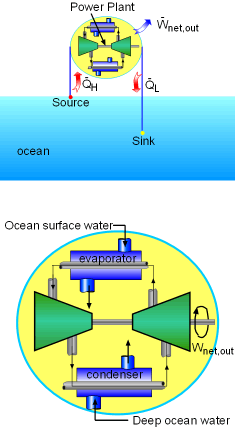| Ch 5. Second Law of Thermodynamics | Multimedia Engineering Thermodynamics | ||||||
| Heat Engine |
The Second Law |
Carnot Cycle |
Carnot Heat Engine |
Carnot Refrigerator |
|||
| Heat Engine | Case Intro | Theory | Case Solution |
| Chapter |
| 1. Basics |
| 2. Pure Substances |
| 3. First Law |
| 4. Energy Analysis |
| 5. Second Law |
| 6. Entropy |
| 7. Exergy Analysis |
| 8. Gas Power Cyc |
| 9. Brayton Cycle |
| 10. Rankine Cycle |
| Appendix |
| Basic Math |
| Units |
| Thermo Tables |
| eBooks |
| Dynamics |
| Fluids |
| Math |
| Mechanics |
| Statics |
| Thermodynamics |
| ©Kurt Gramoll |
|
|
||
| Introduction |
||
 Schematic of an OTEC Power Plant |
A town located on an island near the equator needs a new power plant to generate additional electricity to meet the increasing demand for electrical power. An Ocean Thermal Energy Conversion (OTEC) power plant is considered since it operates between the ocean surface and the deep ocean near the equator of the earth. For economic consideration, the thermal efficiency of the power plant can not be lower than 5%. The ocean surface water, which flows through the evaporator (a heat exchanger) leaves with a temperature of 22 oC due to the vaporization process of the working fluid (propylene) used in the OTEC power plant. The deep ocean water used in the plant is exhausted at 10 oC. The 10 oC water will be used by a local bottling company to help refrigerate drink. In order to design the pipe used to draw water from the ocean, the flow rate of the ocean surface water and deep ocean water that the power plant consumes needs to be determined. What is known:
|
|
| Question |
||
|
|
Determine the volumetric flow rate of the ocean surface water and the deep ocean water |
|
| Approach |
||
|
||